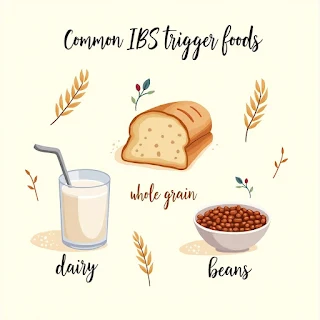Do You Feel Sick After Eating—But Don’t Know Why?
You’re not imagining it.
You eat something normal—maybe a slice of pizza or a bowl of cereal—and within hours, your stomach twists, your gut bloats, and the bathroom becomes your best friend.
That’s not just “something you have to live with.”
It could be Irritable Bowel Syndrome (IBS), and food allergies or intolerances might be making it worse.
Let’s unpack this, in plain English.
What Is IBS—and Why So Many Americans Have It
IBS is a chronic digestive disorder.
It affects 1 in 7 Americans, mostly women under 50.
It messes with your gut, and causes:
-
Cramping
-
Gas
-
Bloating
-
Diarrhea or constipation—or both
Doctors still aren’t exactly sure what causes IBS. But stress, hormones, and your diet all play a role.
And more and more studies are showing that certain foods may be the biggest trigger of all.
Source: NIH – IBS Overview
Allergy or Intolerance—What’s the Difference, and Why It Matters
Here’s the breakdown:
-
Food allergy = Your immune system overreacts.
Even a small bite can cause itching, swelling, hives, or worse. -
Food intolerance = Your gut can’t process a certain food properly.
No immune reaction, but you might get bloated, gassy, or run to the bathroom.
Most people with IBS don’t have full-blown food allergies.
But food intolerances? Way more common than you think.
The Research: Are Food Allergies Linked to IBS?
Short answer: Yes, in many cases.
A 2024 study found that IBS symptoms worsened significantly in people with undiagnosed food allergies or sensitivities—especially to dairy, gluten, and eggs.
Their immune systems reacted in subtle ways that led to gut inflammation and pain.
Source: MDPI Journal – 2024 Study
Common Triggers: What American Foods Make IBS Worse
Here’s what triggers IBS symptoms for many Americans:
-
Dairy: milk, cheese, ice cream
-
Gluten: bread, pasta, baked goods
-
Onions and garlic
-
Beans
-
Sodas and sugar-free gum (high in artificial sweeteners)
-
Coffee and alcohol
Many of these foods are high in FODMAPs, a group of sugars that ferment in your gut and make symptoms worse.
Learn more: Monash University – FODMAP Diet
Could Your IBS Be Triggered by Food? Watch for These Signs
Ask yourself:
-
Do symptoms start within 1–3 hours of eating?
-
Are they worse after certain foods or drinks?
-
Do symptoms improve when you avoid that food?
-
Do you feel better when eating plain, simple meals?
If you said “yes” to any of these, your food could be part of the problem.
Try This: Track Your Symptoms
Here’s a simple way to find out what’s bothering your gut:
-
Keep a food + symptom diary for 7–14 days
Write down every meal and every symptom. -
Remove common triggers for 2 weeks
Start with dairy or gluten. -
Reintroduce one at a time
See what causes a reaction.
Use a free app like MyFitnessPal or Cara Care to help.
Real Story: How Sarah Beat Her IBS
Sarah, 38, from Austin, TX, had IBS for 6 years.
Doctors told her it was “just stress.”
She cut out dairy for two weeks. Her bloating vanished.
Today, she eats mostly plant-based and lactose-free, and hasn’t had a flare-up in months.
Don't Ignore These Symptoms: When to See a Doctor
You need medical help if you:
-
Lose weight without trying
-
See blood in your stool
-
Have constant pain no matter what you eat
-
Can’t work or socialize normally because of symptoms
Find a GI specialist via Mayo Clinic
Practical Tips That Actually Help
-
Avoid processed foods
-
Try a low-FODMAP diet
-
Eat slowly, chew well
-
Stay hydrated
-
Get 7+ hours of sleep
-
Reduce stress (try walking, meditation, or journaling)
Resources You Can Trust
Let’s Be Honest: You Deserve to Feel Better
You don’t have to guess your way through every meal.
You don’t have to accept bloating, pain, and shame after eating.
Your body is telling you something. Are you ready to listen?
Start with one food.
Track one week.
Talk to one doctor.
You just might change your life.






